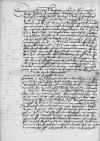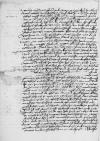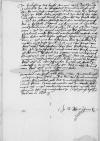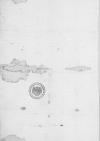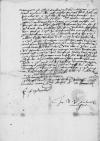Ich hab gestern(n) E(wer) F(urstlicher) Ir(barkei)t ⌊⌋ / mit sundrem(m) wolgefallen(n) entphang(en), / daraus ich E(wer) Ir(barkei)t maynung / und freuntlichen(n) will(e)n gen mir gern(n) vornomen(n), / und bedanck mich hochlich(en) der mhue und freuntlicher sorgfeldigheit, die E(wer) Ir(barkei)t mir zum besten(n) bey sich tregt. / Wor ich ouch das selbtige werde u(m)mer wissen und vormugen(n) treulich und fleissig zu beschulden und vordynen(n), / sol mich E(wer) Ir(barkei)t nicht nochlessig finden(n). /
Was belangt den(n) h(e)rn ⌊doctor(r) Reynek⌋, / wil ich E(wer) Ir(barkei)t wie meym(m) vil liebenn(n) hern(n) und hochem freunde vortrauter weis nicht bergen, / das mein erste kuntschafft mit im ist vor III jor(e)n zu ⌊Augspurg⌋ uffm(m) ⌊reichstage⌋ gewest. / Wart zu mir an mein tisch von h(e)rn ⌊Cornelio Sceppero⌋, / der iczunder nicht lengst vorgang(en) von(n) ⌊kay(serliche)r m(aieste)t⌋ aus ⌊Hungern(n)⌋ zum ⌊Turken(n)⌋ gen(n) ⌊Constatinopel⌋ geschickt ist worden(n), / mit gebrocht / und mit mir bekant gemacht / wie einer, der neulich aus ⌊Engelland⌋ wer paper damaged⌈[er]er paper damaged⌉ komen(n) un(n)d [...] paper damaged⌈[...][...] paper damaged⌉ller hendel heimlich[...] paper damaged⌈[...][...] paper damaged⌉ ⌊Francreich⌋, / Engellandt / un[...] paper damaged⌈[...][...] paper damaged⌉, welche er ⌊ro(mische)r ko(nigliche)r m(aieste)t⌋ / durch underredung mit h(e)rn ⌊Wilhelm von(n) Rogendorff⌋ / erböttig war zu entdecken(n), / vorhoffend villeicht ein nuczliche stelle am(m) hove / oder was anders zuerlang(en) etc. Nicht lengst dar noch wolt er hundert ducat(e)n von mir leyen(n), eh... illegible⌈...... illegible⌉ dan ich wust wer / oder von(n) wan / er wer(r). Darnoch sach ich in ein gutte weil lang nicht, / biss das wir mit ⌊kay(serliche)r m(aieste)t⌋ etlich vil monat im ⌊Niderland⌋ zu ⌊Brussel⌋ woren(n) gewest. / Do kuam er widerum(m)b an meynen(n) tisch / und wold abermols paper damaged⌈[s]s paper damaged⌉ gelt von mir leyen(n). / Zu leczst, / do sein ding am hove nicht fortging, / bat er von mir an(n) E(wer) Ir(barkei)t ei(n)n vorschrifft, / anczeigende, / er wolt erst an(n) ⌊ko(niglich)e wird⌋, / in Got negst vorstorb(e)n, / in ⌊Dennemark(en)⌋ sich begeben(n). / Derhalb(e)n, was ich gedocht(e)r ⌊ko(niglicher)n wird⌋ dass mol zum besten(n) wust, / teilt ich im mit / und gab im nicht sunder ursach an E(wer) Ir(barkei)t mein vorschrifft, / als eynem(m), der gelert und geschickt  GStA, PK, HBA, C 2, No 45, f. 1v genug, / ouch mit h(e)rn / und etwen geswynden(n) hendlenn(n) wol weis umbczughen(n) / und das in E(wer) Ir(barkei)t im Reich heth mocht brauchen. / So ist er mit meynem(m) brive an E(wer) Ir(barkei)t gen(n) ⌊Danczk⌋ komen(n), / noch meyner freuntschaft gefrogt / und sich zu der eingelossen(n), / kein schrifft oder befhel habende von mir, / allein den briff an E(wer) Ir(barkei)t geczegt und so mein freuntschafft mein hant erka(n)nt. / Haben(n) im von meynen(n) wegen ehr(e) und guts bewysen(n), / wor inne er nicht gesetiget. / So vil gesagt, / wie er so wol mit mir daran(n) wer / und so, / ich weis nicht wie, / an mein willen(n) und wissen(n) und meyner ⌊bruder⌋, / nichts habende, / meyne ⌊svester⌋ in die ehe uberredt, / das dan in warheit mir und denn(n) meynen on the margin⌈meynenmeynen on the margin⌉ nicht hot mocht sein unbesverlich. / Idoch, / do ich ins ⌊land⌋ gekomen(n), / hab ich die meynen(n) und mich in gedult gestelt / und do mit / etlicher moss / solche sver muttigheit gestilt / und solche geswyndigheit uberwonnen(n). / Hab ⌊in⌋ und ⌊sie⌋ bey mir ein gutte zceit lang enthald(en), / biss das sie williglich von sich selbst vo(n) hynnen(n) sein geczogen(n) etc. und do mit, das ich nicht vor [...] paper damaged⌈[...][...] paper damaged⌉ff ein historien(n) schreibe, [...] paper damaged⌈[...][...] paper damaged⌉ [...] paper damaged⌈[...][...] paper damaged⌉ssend / [...] paper damaged⌈[...][...] paper damaged⌉nczk bey mir [...] paper damaged⌈[...][...] paper damaged⌉ alles noch seinem(m) hochtragend(en) houpte haben(n). / Do das nicht mocht geschen(n), / enthild ⌊er⌋ sich etlich zceit von mir / un(n)d do es im widerum(m)b wol gefyl, / macht er sich wider zu mir. Ich hab ⌊im⌋ nye kein böss wort geb(e)n, / alles mit im ubersehen(n), / an meym(m) tisch gelossen(n) / und gesegend, do ich von dannen(n) mich begab. / Dornoch schreib ⌊er⌋ mir ein spiczigen(n) briff, / das ich meyn(n) zunegung zu im heth abgelossen(n) / und wer mit unmessiger vorleczung meins gemuets / hesslich oder neydisch, / wie er schreibt, / odiosius, / wider in enczundt, / und so ich seiner nicht bedarff, / und das ander nicht gancz vorgessen(n) ist, / do von die leut vil reden(n), / do mit er mich und die meynen(n) vorseret, / heth er solch stolcz schreiben(n), / und nemlich am endt, / er must sein alte h(e)rn, / do mit er nicht vorgessen(n), / besuchenn(n) etc. wol mocht noch lossen(n). / Dis ist alles, / freuntlicher, lieber her(r), das zcwischen(n) uns ist, / und wirt sich etwas anders haben(n), dan ⌊er⌋ anczeigt, / nichts
GStA, PK, HBA, C 2, No 45, f. 1v genug, / ouch mit h(e)rn / und etwen geswynden(n) hendlenn(n) wol weis umbczughen(n) / und das in E(wer) Ir(barkei)t im Reich heth mocht brauchen. / So ist er mit meynem(m) brive an E(wer) Ir(barkei)t gen(n) ⌊Danczk⌋ komen(n), / noch meyner freuntschaft gefrogt / und sich zu der eingelossen(n), / kein schrifft oder befhel habende von mir, / allein den briff an E(wer) Ir(barkei)t geczegt und so mein freuntschafft mein hant erka(n)nt. / Haben(n) im von meynen(n) wegen ehr(e) und guts bewysen(n), / wor inne er nicht gesetiget. / So vil gesagt, / wie er so wol mit mir daran(n) wer / und so, / ich weis nicht wie, / an mein willen(n) und wissen(n) und meyner ⌊bruder⌋, / nichts habende, / meyne ⌊svester⌋ in die ehe uberredt, / das dan in warheit mir und denn(n) meynen on the margin⌈meynenmeynen on the margin⌉ nicht hot mocht sein unbesverlich. / Idoch, / do ich ins ⌊land⌋ gekomen(n), / hab ich die meynen(n) und mich in gedult gestelt / und do mit / etlicher moss / solche sver muttigheit gestilt / und solche geswyndigheit uberwonnen(n). / Hab ⌊in⌋ und ⌊sie⌋ bey mir ein gutte zceit lang enthald(en), / biss das sie williglich von sich selbst vo(n) hynnen(n) sein geczogen(n) etc. und do mit, das ich nicht vor [...] paper damaged⌈[...][...] paper damaged⌉ff ein historien(n) schreibe, [...] paper damaged⌈[...][...] paper damaged⌉ [...] paper damaged⌈[...][...] paper damaged⌉ssend / [...] paper damaged⌈[...][...] paper damaged⌉nczk bey mir [...] paper damaged⌈[...][...] paper damaged⌉ alles noch seinem(m) hochtragend(en) houpte haben(n). / Do das nicht mocht geschen(n), / enthild ⌊er⌋ sich etlich zceit von mir / un(n)d do es im widerum(m)b wol gefyl, / macht er sich wider zu mir. Ich hab ⌊im⌋ nye kein böss wort geb(e)n, / alles mit im ubersehen(n), / an meym(m) tisch gelossen(n) / und gesegend, do ich von dannen(n) mich begab. / Dornoch schreib ⌊er⌋ mir ein spiczigen(n) briff, / das ich meyn(n) zunegung zu im heth abgelossen(n) / und wer mit unmessiger vorleczung meins gemuets / hesslich oder neydisch, / wie er schreibt, / odiosius, / wider in enczundt, / und so ich seiner nicht bedarff, / und das ander nicht gancz vorgessen(n) ist, / do von die leut vil reden(n), / do mit er mich und die meynen(n) vorseret, / heth er solch stolcz schreiben(n), / und nemlich am endt, / er must sein alte h(e)rn, / do mit er nicht vorgessen(n), / besuchenn(n) etc. wol mocht noch lossen(n). / Dis ist alles, / freuntlicher, lieber her(r), das zcwischen(n) uns ist, / und wirt sich etwas anders haben(n), dan ⌊er⌋ anczeigt, / nichts  GStA, PK, HBA, C 2, No 45, f. 3r wynigers, / so ich so cristlich und freuntlich von E(wer) Ir(barkei)t werd ermant, / der ich nichts vorsagen(n) kan(n), / stelle ich dis alles in E(wer) Ir(barkei)t hende, / und was die wil / bin ich anzunhemen(n) willig. / Ich hab im lengst vorgeben(n) / und vorgib im. / Wan ein sache geschen ist, / kompt der rodt zu speth etc. Bitt, / wie im dan sey, / E(wer) Ir(barkei)t wolt sein gnediger her(r) sein / und dis meyn(n) schreiben, / das so, / E(wer) Ir(barkei)t zu erinnern(n), / die not erfurdert, / gunstlich von mir an nhemen(n) / und so bey E(wer) Ir(barkei)t allein lossen(n) bleiben(n) / und mich do vor halt(e)n, / der E(wer) Ir(barkei)t noch al meyner muglicheit gern(n) treulich und fruntlich dynen(n) wil. / Sol ouch nicht anders von(n) mir werden(n) befunden(n). / Wie aber E(wer) Ir(barkei)t im endt Irs schreibens mich an nympt vor iren beichtvatter, / wil ich mich in dem(m) ampt so halt(e)n, / das sich E(wer) Ir(barkei)t mit sverer buss von mir nicht sol beladen(n) fynden(n). / Got der almechtig gebe uns sein gnad / und enthalde E(wer) Ir(barkei)t mit al den iren(n) in langweriger gesuntheit und glukselig(en) zu nhemen(n) / uff written over und⌈und uff uff written over und⌉ das aller lengste etc. Hiemit thu ich mich in E(wer) Ir(barkei)t gunst un paper damaged⌈[un]un paper damaged⌉d fruntschafft uffs fleissigste bef[...] paper damaged⌈[...][...] paper damaged⌉ [...] paper damaged⌈[...][...] paper damaged⌉rer vormanu[...] paper damaged⌈[...][...] paper damaged⌉ nicht vorgessen(n), / do mit vil [...] paper damaged⌈[...][...] paper damaged⌉ selbtigen(n) endung / noch blibe etc.
GStA, PK, HBA, C 2, No 45, f. 3r wynigers, / so ich so cristlich und freuntlich von E(wer) Ir(barkei)t werd ermant, / der ich nichts vorsagen(n) kan(n), / stelle ich dis alles in E(wer) Ir(barkei)t hende, / und was die wil / bin ich anzunhemen(n) willig. / Ich hab im lengst vorgeben(n) / und vorgib im. / Wan ein sache geschen ist, / kompt der rodt zu speth etc. Bitt, / wie im dan sey, / E(wer) Ir(barkei)t wolt sein gnediger her(r) sein / und dis meyn(n) schreiben, / das so, / E(wer) Ir(barkei)t zu erinnern(n), / die not erfurdert, / gunstlich von mir an nhemen(n) / und so bey E(wer) Ir(barkei)t allein lossen(n) bleiben(n) / und mich do vor halt(e)n, / der E(wer) Ir(barkei)t noch al meyner muglicheit gern(n) treulich und fruntlich dynen(n) wil. / Sol ouch nicht anders von(n) mir werden(n) befunden(n). / Wie aber E(wer) Ir(barkei)t im endt Irs schreibens mich an nympt vor iren beichtvatter, / wil ich mich in dem(m) ampt so halt(e)n, / das sich E(wer) Ir(barkei)t mit sverer buss von mir nicht sol beladen(n) fynden(n). / Got der almechtig gebe uns sein gnad / und enthalde E(wer) Ir(barkei)t mit al den iren(n) in langweriger gesuntheit und glukselig(en) zu nhemen(n) / uff written over und⌈und uff uff written over und⌉ das aller lengste etc. Hiemit thu ich mich in E(wer) Ir(barkei)t gunst un paper damaged⌈[un]un paper damaged⌉d fruntschafft uffs fleissigste bef[...] paper damaged⌈[...][...] paper damaged⌉ [...] paper damaged⌈[...][...] paper damaged⌉rer vormanu[...] paper damaged⌈[...][...] paper damaged⌉ nicht vorgessen(n), / do mit vil [...] paper damaged⌈[...][...] paper damaged⌉ selbtigen(n) endung / noch blibe etc.
 GStA, PK, HBA, C 2, No 45, f. 2r
GStA, PK, HBA, C 2, No 45, f. 2r
In beslissung dis briffs sein mir word(en) / die spruche ⌊Salomo(n)is⌋, / die der hochgelert ⌊Ioannes Campensis⌋ hie bey mir dissen vorgangen(n) winter aus dem hebreisschen in klar latin geseczt / und im druk hot lossen(n) aus ghen, / mich durch sein schreib(e)n von(n) ⌊Krako⌋ bittend, / E(wer) Ir(barkei)t die selbigen spruche / und sein auslegung uff die II episteln s(ancti) Pauli ad Romanos et Galatas / mitzuteilen und zu senden(n). / Und so ich dan weis, das E(wer) Ir(barkei)t in seiner auslegung des psalters un(n)d psalmen(n) / nicht kleinen(n) wolgefallen(n) gehabt, / ouch gern beten und lesen pflegt, / hab wir disse buchlein E(wer) Ir(barkei)t mit den erst(en) wollen zustellen(n), / do neben ouch disse zceitung, / so mir von ⌊Prage⌋ von ⌊kay(serliche)r m(aieste)t⌋ botschafftern(n), dem(m) h(e)rn elect(e)n von Lunden, sein zugeschriben(n), / ouch was von(n) ⌊Krako⌋ an mich ist komen(n), / bittend die copeyen mir widerzusend(en). / Ouch wil ich E(wer) Ir(barkei)t nicht bergen(n), / das ich negst von(n) meynem(m) vortrauten(n) freunde, h(e)rn ⌊Cornelio Sceppero⌋, ⌊kay(serliche)r m(aieste)t⌋ o(rato)r, aber ⌊⌋ entfang(en) habe, / in welchem er mir anczeigt, / das er wideru(m)mb von kay(serliche)r m(aieste)t aus ⌊Hispanien⌋ post[...] paper damaged⌈[...][...] paper damaged⌉ [...] paper damaged⌈[...][...] paper damaged⌉pol zum grossen [...] paper damaged⌈[...][...] paper damaged⌉ worden(n). / Vorhofft vil gut[...] paper damaged⌈[...][...] paper damaged⌉ wa[...] paper damaged⌈[...][...] paper damaged⌉ fried belangt, / auszurichten(n), / vil anders dan(n) von ⌊Krako⌋ mir wirt geschriben(n). / Got gebe, das er mit gesuntheit widerumb ko(m)me. / Was ich weiter von im werde hab(e)n, wil ich E(wer) Ir(barkei)t vortrauter weis gern(n) mitteilen(n). / Hiemit thu ich mich aber in E(wer) Ir(barkei)t gunst befel(e)n. / Dat(um) ut in l(itte)ris etc.
⌊
Io(annes)⌋, b(ischoff) zu ⌊Culmen⌋ etc. s(crip)s(i)t
 GStA, PK, HBA, C 2, No 45, f. 3v
GStA, PK, HBA, C 2, No 45, f. 3v  GStA, PK, HBA, C 2, No 45, f. 1r
GStA, PK, HBA, C 2, No 45, f. 1r  GStA, PK, HBA, C 2, No 45, f. 1v genug, / ouch mit h(e)rn / und etwen geswynden(n) hendlenn(n) wol weis umbczughen(n) / und das in E(wer) Ir(barkei)t im Reich heth mocht brauchen. / So ist er mit meynem(m) brive an E(wer) Ir(barkei)t gen(n)
GStA, PK, HBA, C 2, No 45, f. 1v genug, / ouch mit h(e)rn / und etwen geswynden(n) hendlenn(n) wol weis umbczughen(n) / und das in E(wer) Ir(barkei)t im Reich heth mocht brauchen. / So ist er mit meynem(m) brive an E(wer) Ir(barkei)t gen(n)  GStA, PK, HBA, C 2, No 45, f. 3r wynigers, / so ich so cristlich und freuntlich von E(wer) Ir(barkei)t werd ermant, / der ich nichts vorsagen(n) kan(n), / stelle ich dis alles in E(wer) Ir(barkei)t hende, / und was die wil / bin ich anzunhemen(n) willig. / Ich hab im lengst vorgeben(n) / und vorgib im. / Wan ein sache geschen ist, / kompt der rodt zu speth etc. Bitt, / wie im dan sey, / E(wer) Ir(barkei)t wolt sein gnediger her(r) sein / und dis meyn(n) schreiben, / das so, / E(wer) Ir(barkei)t zu erinnern(n), / die not erfurdert, / gunstlich von mir an nhemen(n) / und so bey E(wer) Ir(barkei)t allein lossen(n) bleiben(n) / und mich do vor halt(e)n, / der E(wer) Ir(barkei)t noch al meyner muglicheit gern(n) treulich und fruntlich dynen(n) wil. / Sol ouch nicht anders von(n) mir werden(n) befunden(n). / Wie aber E(wer) Ir(barkei)t im endt Irs schreibens mich an nympt vor iren beichtvatter, / wil ich mich in dem(m) ampt so halt(e)n, / das sich E(wer) Ir(barkei)t mit sverer buss von mir nicht sol beladen(n) fynden(n). / Got der almechtig gebe uns sein gnad / und enthalde E(wer) Ir(barkei)t mit al den iren(n) in langweriger gesuntheit und glukselig(en) zu nhemen(n) / uff written over und⌈und uff uff written over und⌉ das aller lengste etc. Hiemit thu ich mich in E(wer) Ir(barkei)t gunst un paper damaged⌈[un]un paper damaged⌉d fruntschafft uffs fleissigste bef[...] paper damaged⌈[...][...] paper damaged⌉ [...] paper damaged⌈[...][...] paper damaged⌉rer vormanu[...] paper damaged⌈[...][...] paper damaged⌉ nicht vorgessen(n), / do mit vil [...] paper damaged⌈[...][...] paper damaged⌉ selbtigen(n) endung / noch blibe etc.
GStA, PK, HBA, C 2, No 45, f. 3r wynigers, / so ich so cristlich und freuntlich von E(wer) Ir(barkei)t werd ermant, / der ich nichts vorsagen(n) kan(n), / stelle ich dis alles in E(wer) Ir(barkei)t hende, / und was die wil / bin ich anzunhemen(n) willig. / Ich hab im lengst vorgeben(n) / und vorgib im. / Wan ein sache geschen ist, / kompt der rodt zu speth etc. Bitt, / wie im dan sey, / E(wer) Ir(barkei)t wolt sein gnediger her(r) sein / und dis meyn(n) schreiben, / das so, / E(wer) Ir(barkei)t zu erinnern(n), / die not erfurdert, / gunstlich von mir an nhemen(n) / und so bey E(wer) Ir(barkei)t allein lossen(n) bleiben(n) / und mich do vor halt(e)n, / der E(wer) Ir(barkei)t noch al meyner muglicheit gern(n) treulich und fruntlich dynen(n) wil. / Sol ouch nicht anders von(n) mir werden(n) befunden(n). / Wie aber E(wer) Ir(barkei)t im endt Irs schreibens mich an nympt vor iren beichtvatter, / wil ich mich in dem(m) ampt so halt(e)n, / das sich E(wer) Ir(barkei)t mit sverer buss von mir nicht sol beladen(n) fynden(n). / Got der almechtig gebe uns sein gnad / und enthalde E(wer) Ir(barkei)t mit al den iren(n) in langweriger gesuntheit und glukselig(en) zu nhemen(n) / uff written over und⌈und uff uff written over und⌉ das aller lengste etc. Hiemit thu ich mich in E(wer) Ir(barkei)t gunst un paper damaged⌈[un]un paper damaged⌉d fruntschafft uffs fleissigste bef[...] paper damaged⌈[...][...] paper damaged⌉ [...] paper damaged⌈[...][...] paper damaged⌉rer vormanu[...] paper damaged⌈[...][...] paper damaged⌉ nicht vorgessen(n), / do mit vil [...] paper damaged⌈[...][...] paper damaged⌉ selbtigen(n) endung / noch blibe etc.
 GStA, PK, HBA, C 2, No 45, f. 2r
GStA, PK, HBA, C 2, No 45, f. 2r 